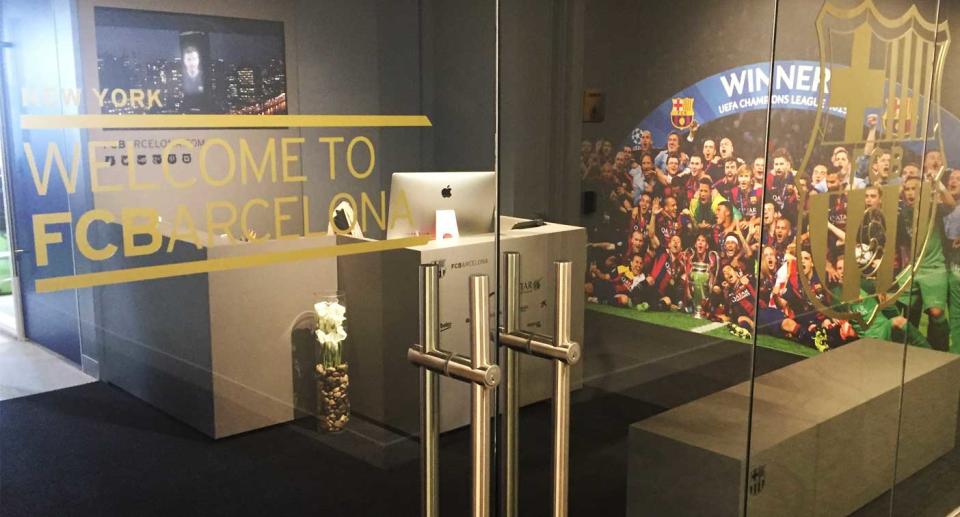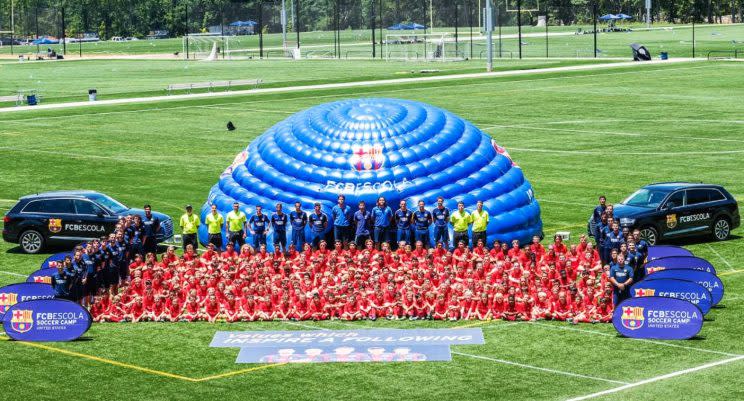FC Barcelona has master plan to conquer America from its New York City offices

NEW YORK – Imagine you were a teenaged boy. You’re not into music or comic books, but you are completely obsessed with soccer. Specifically, your favorite club: Barcelona. Also, you have impeccable decoration taste, inexplicable access to some of the club’s silverware and a pretty much unlimited budget.
Your bedroom would look more or less like the club’s recently opened offices on Park Avenue in Manhattan.

A few accent pieces – an official Champions League replica cup, a La Liga and a Copa del Rey trophy – take up prime spots in the smallish but swanky office’s astroturfed lounge, perched atop stands and lit to make them glimmer just so. But this 20th-floor space, a block behind Grand Central Station, isn’t just some overseas trophy room. The point isn’t to boast of the ways in which Barça has had a historically dominant run over the last 11 years – claiming seven Spanish league titles, four Spanish cups, four European crowns and three Club World Cups – while fundamentally altering the way in which the sport is played.
Barcelona has opened an office stateside not to venerate its own recent past but to safeguard the future. The club has ambitious plans in the United States for as many as 20 academies with regular camps and for its foundation to help at-risk school children. And, of course, to further build and monetize its brand in North America.
The New York City office was opened on Sept. 6 by the club’s Brazilian former superstar playmaker Ronaldinho, who has since become an official ambassador to do the difficult work of going to the NBA All-Star Game and taking pictures with Steph Curry.
@stephencurry30 @fcbarcelona ⚽️ @nba ???? @nbaallstar #NBAAllStar #NBACelebGame
A post shared by Ronaldo de Assis Moreira (@ronaldinho) on Feb 18, 2017 at 12:09pm PST
During New York Fashion Week, the club hosted a reception for the Custo Barcelona brand. But those are just photo ops to announce its arrival. And while it helps to be closer to American sponsors – currently Nike, Gatorade, Black & Decker and Gillette – and establish a beachhead to sign up more of them, the larger objective is to cement the American fan base. The club claims, citing the Nielsen Sports agency’s findings, that its following in the United States is already larger than that of any other club in the world, counting some 20 million people and recently wresting the lead from Manchester United.
“For us, it’s the right moment to be here. We can engage these fans first,” says Arno Trabesinger, Barça’s Managing Director for the Americas, arguing that the fans’ connection with local American soccer clubs is still largely casual and that their loyalty is still in play. “We want to be in all parts of the world with our brand, with our values and with what FC Barcelona is all about. We are not only a sports club; we are more than a club.”
The club’s motto is “Més que un club” – “More than a club” – in Catalan.
“We want to show the U.S. that we are not only the goals of Messi, Suarez and Neymar,” Trabesinger adds. “But that we have a strong social commitment that we want to bring also to the U.S.”

This doesn’t just appear to be quasi-mandatory lip service.
Barcelona, as a club, has a famously strong social conscience, perhaps as the upshot of being seen as the dominant institution of the long-oppressed and secessionist Spanish region of Catalonia. The FC Barcelona Foundation signed an agreement with New York City to launch its FutbolNet program, which fights bullying and social exclusion among children through tailored soccer games in the city’s public schools as a national pilot, reaching some 1.5 million kids in one swoop. For example, a bullied child’s goals might count double to encourage his inclusion by domineering peers.
“Our basic goal is to build the real brand of FC Barcelona based not only on the game of football or the scores,” says Ignacio Mestre, the Foundation’s CEO. “Barcelona is more than a club. The Foundation is the ‘More than a club.’ ”
But FC Barcelona is also frank in its primary reason for expanding abroad. It opened an office in Hong Kong in 2013 and has seen an enormous sponsorship return in Asia. It’s looking into a Brazilian office as well. Why? Because the club is aiming to grow its revenues to a billion euros a year by 2021.
“This year, we are close to 700 million euros,” Trabesinger says of the revenue that’s up about tenfold from the late ’90s. “The growth in not only FC Barcelona, but in all the clubs in Europe, was so strong in the last years, now comes the point that we have to consolidate and make it sustainable.”

Barça doesn’t have an owner. It has 150,000 of them, the socios – directly translated as “partners” – who are dues-paying members with the right to elect the president and board every six years. Unlike Barcelona’s rivals in England and elsewhere in Europe, the club has no rich sugar daddy owner. There’s nobody to pump in a few million here or there when the club wants to undertake some infrastructure project or invest elsewhere.
“We have to generate all the money we invest through our activities,” Trabesinger says. “The reason why we’re going international, opening offices all over the world, is we want to establish the brand and the sustainability of this club independently of what is happening on the pitch. The sustainability of the club cannot depend on goals of our great players. We want to establish our position independent of that.”
An international revenue mechanism offers stability in an inherently unstable business. It also hedges against the fickle Spanish economy, which is only just clambering out of an exasperating eight-year recession that saw unemployment spike to a jaw-dropping 36 percent – with youth unemployment at 50 percent. (As a reference point: At the deepest depths of the Great Depression, unemployment in the U.S. was 25 percent.) Barça’s earnings potential in Spain and Europe as a whole is more or less maxed out, now that La Liga has begun centralizing the sale of broadcast rights for the entire league.
If Barca is going to keep up in elite European club soccer’s perpetual arms race, it needs firm footing in other continents. So it signed a decade-long lease on its New York office and committed for the longer term.
“This was one of the problems of European clubs,” Trabesinger says. “So many came here to the U.S. and after a certain time disappeared. But we want to come here to stay here. We’ll start slowly with our activities, but we want to leave a strong footprint in the U.S.”
That vision does not include a Barça-owned MLS team, Trabesinger insists, although there was talk of one for years.
“The only place where we play professional men’s soccer is Barcelona,” he says.

The final and most expansive part of Barça’s American strategy is to license its world-famous youth player academy nationwide. Two schools, in Charlotte, N.C. and Ft. Lauderdale, Fla., are already up and running. Four more are slated to open in Austin, Texas, San Diego, Chicago and Virginia. The club envisions having 20 in all, along with camps. The academies fall under the framework of the global FCB Escola – Catalan for “school” – and are managed by local partners.
“We guarantee from FC Barcelona that the kids who attend the schools really get the Barça feeling, that they train the way we play soccer,” Trabesinger says. “We don’t sell our logo. We cooperate with a local partner and bring our coaches in and really teach the same way of playing which we are teaching in La Masia, our academy.”
The year-round academies practice in the afternoon, after its players aged six to 16, finish with their regular school. Each academy is overseen by a head coach imported from Barcelona, while the local coaches are instructed in Barça’s methods.
These academies aren’t intended as extensions of the youth system in Catalonia, though.
“To be honest with you, one of the objectives is not to find talent for the first team,” Trabesinger concedes. “Obviously, if there’s a big, big talent … – but this is not the reason. It’s for us a brand-building initiative. It spreads the message of FC Barcelona. And it’s also a revenue stream.”
He argues that with an Escola of 1,000 players – all of whom will pay to play – you directly “touch” some 10,000 people with the brand.
These are intended as serious and competitive academies, too. The clubs hopes to enter U.S. Soccer’s tightly-regulated Development Academy, the top tier of the American youth game, to win trophies and to help develop better players.
But if Barcelona will spread its vaunted training methods stateside, the club sees the education as a two-way street. Trabesinger attended the All-Star Game and the Super Bowl and came away wowed by the fan experience and engagement, suggesting Barça lags behind in these areas.
“We’re also here,” he says, “to learn.”
Leander Schaerlaeckens is a soccer columnist for Yahoo Sports. Follow him on Twitter @LeanderAlphabet.


